Greetings!
And what a week it has been. First and foremost, my Cuban tourist card has arrived and so I am now fully ready to head off to the land of Fidel, Che, cigars and rum in a few months’ time. As part of my continuing preparations for that trip, I checked out Chris Tarrant’s Extreme Railway Journeys: Slow Train to Guantanamo Bay which covered much of the journey that intend to take and, having got into the series, then watched The Great Japanese Train Ride which brought back lots of memories of whizzing about on shinkansen in Japan and One-Way Ticket to Siberia which has made me think about planning a future trip along the aborted Trans-Polar Railway, heading beyond the Arctic Circle into a land of ice and snow. We shall see…
Not all my travels this week however, have been virtual, for yesterday I headed down to London with my son to take up the kind invitation of our brilliant local MP Ruth Smeeth to have a guided tour of the Houses of Parliament. One of the most iconic buildings in the world, it was an honour to have it shown to us by an insider and great to see how a child can become inspired by politics if it is presented in a fun way. We engaged in a mock debate, saw where Guy Fawkes put his powder and ate in the famous canteen. It was also a chance to talk to Ruth about a shared connection, for like me, she is familiar with Israeli kibbutzim. Which brings us onto today’s post which is all about politics, and how decades-old divisions can be overcome with a smile, a drink and a Beatles track or two…
Keep travelling!
Uncle Travelling Matt
Links to other parts of the travelogue:
Sacred Pilgrimage
Part 2: Ash Wednesday in Jerusalem
Part 4: Exploring the Old City
Part 7: Up the Mount of Olives
Part 8: Further explorations of Jerusalem
Secular Pilgrimage
Part 2: An Introduction to Kibbutz Living
Part 4: The Silence of the Desert
Part 6: Tearing down the Wall!
Part 7: Beautiful (?) Beersheva
Part 9: Reminders of Troubled Times
I took a solitary walk across to Beverley Hills and the old Ulpan classroom. As with places where something of historical importance once took place, if I were to put up blue plaques to commemorate the seminal events in my life, then that humble building would certainly be graced with one. Kibbutz Revivim changed my life in many ways, after those unnerving first couple of days when all I wanted to do was jump on a plane back to Britain, I grew to cope and then thoroughly enjoy the kibbutz experience. The most life-changing event of all though, happened almost a month after my arrival, on February 21st, 1997.
Only the day before Elton and Adrienne Netto, fellow volunteers from New Zealand, had invited me to go with them on a day trip to Jerusalem in their camper van. Beyond Tel Aviv and Revivim I had seen little of Israel so I was glad to go. When I got to the van in the morning, I found to my surprise that there were two other travellers already on board, Pepa and Simeon Kovatchevi, a young Bulgarian couple who were on the Ulpan course and also worked part-time with Elton in the factory.[1] They were an engaging couple; she dashingly beautiful and speaking excellent English whilst he had a wicked sense of humour, looked like Charlie Chaplin and loved clowning around. Just as importantly though, they were from behind the Iron Curtain.
This is probably hard for people today, only a decade on, to understand, but for me, being from behind the Iron Curtain was a big deal. I grew up during the Cold War; I vividly remember being told at primary school that the Russians could – and probably would – attack at any time, that shadowy evil men sat with their fingers over the button ready to obliterate us all with the Bomb whenever they felt like it. In all the films that I was weaned on, the Russians were the bad guys, communism = evil, they were a race apart. Now we can – and often do – go to Krakow, Riga, Prague or Berlin for the weekend, back then travel beyond the Wall was virtually impossible. I only knew one guy that had done it, my father, and he had travelled with the UN and possessed three passport stamps for one single crossing of the Berlin Wall.
In addition to all of this, over the preceding few years, as I had become an adult and developed a sense of political identity, I had become a staunch socialist. I wanted to help the less well-off, the rich and their greed and selfishness disgusted me and I longed to make them pay for their crimes, to create an egalitarian paradise on earth where everyone could have what they needed. I was not religious back then, but I was fired by belief, a belief in a better world. My trip to Revivim was a pilgrimage, a secular, socialist pilgrimage. I was living and working on a genuine, real-life commune and now, to top it all off, I was getting to know two genuine Eastern Blockers!
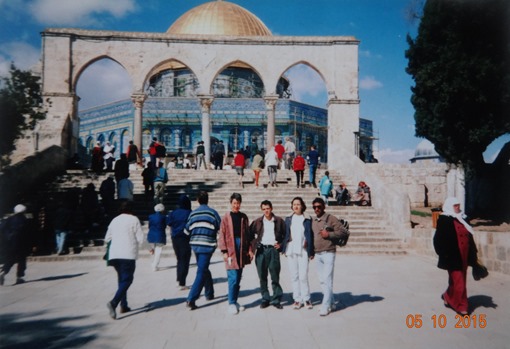 Adrienne, Simeon, Pepa and Elton in Jerusalem
Adrienne, Simeon, Pepa and Elton in Jerusalem
The next day I received a message from Adrienne in the dining room. “It’s Pepa’s birthday today and she’s having a party in the Ulpan room. She wants you to come.” An invite to a party from a woman who was not only Eastern Bloc but also hot; this was the stuff of fantasy! But I was shy back then. “Are you going?” I asked Adrienne. “No, Elton’s got the flu. You’ll have to find somebody else, sorry.” Somebody else? But who? I went for the obvious and asked Tom from Holland, my workmate and roommate. “Ja, I’ll come,” said the Dutchman who was also partial to a drink and beautiful women. And so, we went.
That evening changed my life. There we were, the Dutchman and I, and a room full of partying young people. Only a couple of them spoke English, all of them were from behind the Iron Curtain. Tom felt like a brother to me in both culture and language and that was a revelation. Remember, I am from a village; prior to Israel, virtually everybody in my address book had an ST11 postcode. Only a month before that Dutchman seemed like the most exotic person on earth. That evening though, in comparison with all those Russian-speaking Ulpan students, he seemed virtually English.
They were from everywhere communist: Uzbekistan, Hungary, Bulgaria, Latvia, the Ukraine, Russia, you name a Warsaw Pact country and it had a representative in that room. But at the same time, they were not the shadowy figures who wanted to blow us all up just because they could, they were human beings just like Tom and I. They liked the Beatles and Jamiroquai; they enjoyed a drink and a cigarette, and they loved football. I got chatty with Bela, a drunken Hungarian who liked to exclaim “Dzeezuz Christ!” after everything he said and Pavel, a Ukrainian who knew all the words to ‘Yellow Submarine’, (but struggled with most other things in English). That evening a fascination with the Other, its peoples and cultures, began. It has not abated to this day. I returned to Israel in 1998 and 1999, but it wasn’t to meet up with other volunteers or even Yankalei and Sara, it was to Maja and Andrei Spektor-Kovalsky, a Ukrainian couple; Pavel Serebryakov, the Beatles-lover from Donetsk; Katya Niego, a Sephardi Jew from Haskovo, Bulgaria and Pepa and Simeon Kovatchevi. Friendship with them developed into a desire to travel to their homelands and learn more about their histories. Since that party, I have become almost fluent in Bulgarian, I have lived in Bulgaria for a year and I’ve visited most of the countries of the old Communist World. Without that party in the Ulpan Room, I would probably have done none of those things. I may also not have visited Japan and the Far East and developed the all-consuming passion for travel that now guides my life, for it was the kibbutz experience in general and that party in particular that opened my eyes to the world. That is why, this 2009 pilgrimage to Revivim was a homage to something far bigger than just the kibbutz.[2]
Here of some of the more memorable of the Ulpan students:
Pepa and Simeon who I’ve already mentioned in this account were a young Bulgarian couple who had emigrated to Israel largely for financial reasons. Neither were Jewish but he had a Jewish grandmother which qualified him, (and her if they married), for Israeli citizenship. Their parents however, particularly hers, had been dead against the match since it involved her quitting Sofia University mid-degree, so they’d done a Gretna as it were and then presented the marriage as a fait accompli to their elders after the ceremony. Maybe however, they should have listened to their betters since it wasn’t to last.[3] When I returned a year later, he was making bagels in Eilat and she was sleeping on Katya’s (see below) sofa.[4] For me personally, these two hold a special place in my heart as they ignited an interest in Bulgaria in me that has not waned since. I lost touch with both circa 2004 but I am still in contact with Pepa’s sister Maria who lives in Chicago. Pepa was in London last I heard whilst in 2015 I regained contact with Simeon who now lives in Germany with his new partner and family.
 Katya, Simeon, Pepa, me and Irina (?) in the dining hall
Katya, Simeon, Pepa, me and Irina (?) in the dining hall
Katya was the other Bulgarian. Like Pepa and most other Bulgarian girls, she was very pretty. After Ulpan she moved to Holon. One presumes that she settled better than her compatriots because she was actually Jewish. Certainly, she embraced the Israeli lifestyle far more than they did. I met her again on new Year’s Eve, 1999 when we attended a Shturtsite[5] concert together in Tel Aviv. We are still in touch .
Pavel was the young Ukrainian who spoke no English but loved the Beatles. Later he learnt a modicum of my tongue and I a modicum of his and we drank together in Haifa in 1998 and 1999. I am no longer in touch with him which is a shame since he was a great guy.
Bela was a Hungarian who liked to drink as much as George and Philippe (see below). Consequently, he spent most of his time with George and Philippe. In the long run he was unimpressed with Israel and returned to Hungary where he resides to this day. Many of the photos in this travelogue were taken by him.
Maija and Andrei were a young Ukrainian couple who moved to Beersheva after Ulpan where I visited them. They were a lovely couple who unfortunately worked far too hard – both had nursing qualifications in the Ukraine that were not recognised by Israel so they had to re-sit them all whilst working full-time in menial, low-paid jobs – which resulted in them separating in 1999 after her ‘friendship’ with an Ethiopian Jew. Sadly Maija, who was the main conduit of communication, stopped writing then, doubtless because only a month before I’d banged on to her when drunk about what a great couple she and Andrei made.
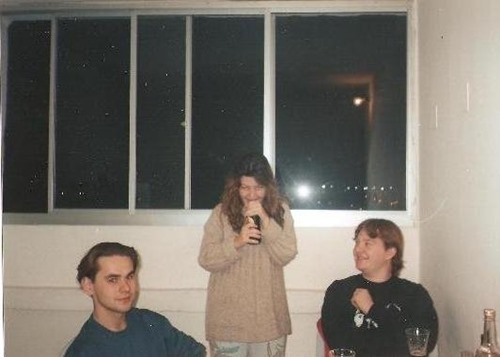 Andrei, Maija and I in Merkaz Klita Ye’elim, Beersheva, 1999
Andrei, Maija and I in Merkaz Klita Ye’elim, Beersheva, 1999
Next part: Beautiful (?) Beersheva
[1] Revivim’s industrial concern is Raviv Plastics, a small factory manufacturing injection moulded items such as car door handles or toothbrushes. I later worked there for a month after I’d finished on the chickens.
[2] I sit writing these words in a classroom full of foreign nationals from homelands as diverse as Holland, Lithuania, Pakistan, Poland and Romania. That’s my job these days and my chosen career is another direct result of my time on Revivim.
[3] Reading my diary, there were intimations that such might happen even on the kibbutz. The entry for Friday 28th April reads, ‘The disco – Pepa got off with Jan all nite (Simon not there). Elton v. upset.’
[4] See my travelogue, ‘Settling Into Israel’
[5] Bulgaria’s most famous rock band.
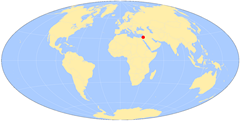
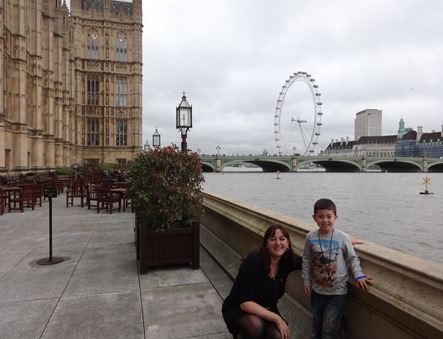

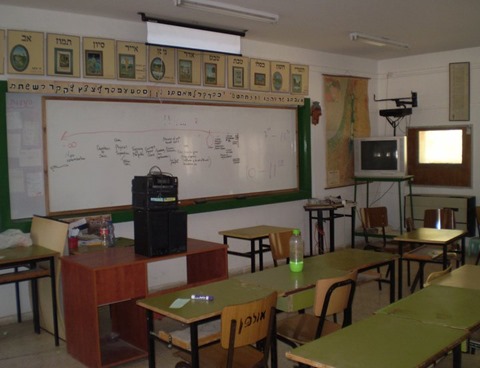
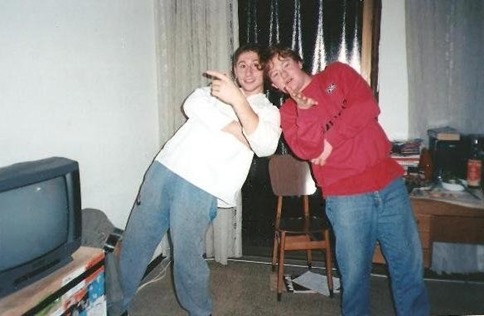
No comments:
Post a Comment